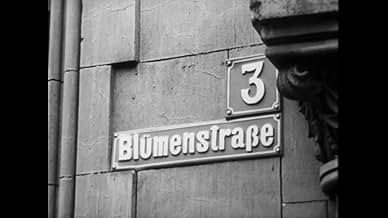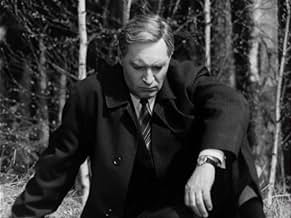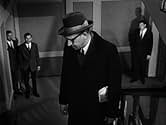NOTE IMDb
8,7/10
5,3 k
MA NOTE
Ajouter une intrigue dans votre langueDuring World War II, a Soviet undercover spy manages to infiltrate the Nazi elite.During World War II, a Soviet undercover spy manages to infiltrate the Nazi elite.During World War II, a Soviet undercover spy manages to infiltrate the Nazi elite.
Parcourir les épisodes
Avis à la une
10Yuri-8
One of the little-recognized deficiencies of spy movies is that 'action'--chases, shootings, explosions, etc.--is dominant content. Of course, the trend caters to modern audiences that are addicted to sound and special effects. However, action-driven spy movies (e.g., James Bond) suffer from 3 major defects: 1)They are not believable 2)They contain little or no acting performances to speak of 3)As such, they are easily forgettable. This is not the case with "17 moments of spring" (hereafter SMOS)
The 12 episodes of the series have been specifically shot in Black and White, in fairly simple studio sets, with no special visual effects. What makes SMOS the favorite of audiences, is a gamut of absolutely incredible acting. Each role, even a minor one, casts an "all-star" Soviet actor, and they deliver deep psychological performances. Tikhonov is an obvious star as Stierlitz, but consider Leonid Bronevoy as Mueller, the friendly, always suspicious and incredibly cruel inside Gestapo chief. Or Oleg Tabakov, as cheerful Schellenberg of the German intelligence. Or Plyatt as very vulnerable and very human Pastor Schlag who nevertheless embodies the power of the Church.
So essentially SMOS is not a spy movie, but a tight psychological drama. But we must not forget the subject, and it is an important one, based on a major real life event: in early 1945, trying to finish off the Nazi Germany, the Russians found out that SS-gruppenfuehrer Karl Wolff (essentially a representative of the odious Himmler) attempted to negotiate a separate piece with the Americans in Italy. The talks were top-secret (OSS star Allen Dulles was the US negotiator) and essentially meant a betrayal of Russia by its anti-Nazi allies. SMOS is about how the Russians discovered the secret and forced the end to negotiations.
In short, this is one of the greatest all-time spy thrillers. Just as "Rosemary's Baby" is arguably the best horror movie because of its acting and directing, so does SMOS shine through the mediocrity we are fed today. I wish it were shown to the wide Western audiences, so that they can see for themselves!
The 12 episodes of the series have been specifically shot in Black and White, in fairly simple studio sets, with no special visual effects. What makes SMOS the favorite of audiences, is a gamut of absolutely incredible acting. Each role, even a minor one, casts an "all-star" Soviet actor, and they deliver deep psychological performances. Tikhonov is an obvious star as Stierlitz, but consider Leonid Bronevoy as Mueller, the friendly, always suspicious and incredibly cruel inside Gestapo chief. Or Oleg Tabakov, as cheerful Schellenberg of the German intelligence. Or Plyatt as very vulnerable and very human Pastor Schlag who nevertheless embodies the power of the Church.
So essentially SMOS is not a spy movie, but a tight psychological drama. But we must not forget the subject, and it is an important one, based on a major real life event: in early 1945, trying to finish off the Nazi Germany, the Russians found out that SS-gruppenfuehrer Karl Wolff (essentially a representative of the odious Himmler) attempted to negotiate a separate piece with the Americans in Italy. The talks were top-secret (OSS star Allen Dulles was the US negotiator) and essentially meant a betrayal of Russia by its anti-Nazi allies. SMOS is about how the Russians discovered the secret and forced the end to negotiations.
In short, this is one of the greatest all-time spy thrillers. Just as "Rosemary's Baby" is arguably the best horror movie because of its acting and directing, so does SMOS shine through the mediocrity we are fed today. I wish it were shown to the wide Western audiences, so that they can see for themselves!
10vldv22
What make this movie unique, is how Germans are shown. They are villains, but unlike in many modern movies these villains are not ugly, stupid or emotionless. They have personalities, they are clever, cunning and often charming. Just like one would assume many Nazis were in real life.
There is no much shooting or killing in this film. No special effects. What it has is a great story (loosely based on actual events, I think), great acting, dialogues, and cinematography. Although there are 12 episodes of the film, you will wish there have been more.
Great film. I should watch it again...
There is no much shooting or killing in this film. No special effects. What it has is a great story (loosely based on actual events, I think), great acting, dialogues, and cinematography. Although there are 12 episodes of the film, you will wish there have been more.
Great film. I should watch it again...
10sunlion
This series are far greater than anything that has been filmed about war ever. It shows closely characters of German Nazi top during the last weeks of the war, when they understand that the war is lost. A Russian spy is working among them speeding up the war's end.
The pace of the film is slow and thorough, the movie is meant for people with ability to analyze, reflect. Characters of the people involved are depicted are so lively that the film fuses with the documentary pieces. Acting is extremely raw and natural, it actually in't acting, it's living. Tihonov in a role of Stirlitz portrays a real spy - brilliantly talented, sharp, calm, cold, patient - everything that areal spy has to be. At the same time he is not a greedy adventurous coat-turner, he works for his country, his people, his family. And the last - this film works as a litmus test on people. If you don't understand it you simply haven't matured for it. The film itself is flawless.
The pace of the film is slow and thorough, the movie is meant for people with ability to analyze, reflect. Characters of the people involved are depicted are so lively that the film fuses with the documentary pieces. Acting is extremely raw and natural, it actually in't acting, it's living. Tihonov in a role of Stirlitz portrays a real spy - brilliantly talented, sharp, calm, cold, patient - everything that areal spy has to be. At the same time he is not a greedy adventurous coat-turner, he works for his country, his people, his family. And the last - this film works as a litmus test on people. If you don't understand it you simply haven't matured for it. The film itself is flawless.
This movie is one of the top 10 movies for any Russian. Even if you are a foreigner, if you have subtitles or other mean of understanding the plot - you will be stick to your chair for all 11 (is it 11 or 13?) episodes.
The book of Semenov was great and the movie is even better. Great actors, who knew what the war is and how to show it. Amazingly intense plot, without any special effect, all rooted in the chess game between a Russian spy and German (nazi) opponents. Stylish black and white. In 1973 it was common, now it just looks good, as a true documentary.
What else? Music is perfectly suited to the moment and the whole movie is not seeking to draw a line between "good" and "bad" guys but, instead, trying to draw you into the tense atmosphere of the last 3 months preceding the end of WW2.
If you ask a few Russians in the street of Moscow or any other city what number 17 means to him, I bet $100 that over 90% will say "17 Moments of Spring" which stands for "Semnadtsat mgnovenij vesny".
The book of Semenov was great and the movie is even better. Great actors, who knew what the war is and how to show it. Amazingly intense plot, without any special effect, all rooted in the chess game between a Russian spy and German (nazi) opponents. Stylish black and white. In 1973 it was common, now it just looks good, as a true documentary.
What else? Music is perfectly suited to the moment and the whole movie is not seeking to draw a line between "good" and "bad" guys but, instead, trying to draw you into the tense atmosphere of the last 3 months preceding the end of WW2.
If you ask a few Russians in the street of Moscow or any other city what number 17 means to him, I bet $100 that over 90% will say "17 Moments of Spring" which stands for "Semnadtsat mgnovenij vesny".
10lowway
One of the best films of Soviet Union. It is not about intrigues and spy games, though the plot is really gripping. Last months of WW II. Shtirliz - Soviet resident is under suspection of Gestapo. Being in the heart of Hitler's sistem, he struggled with hazi regime long years. The Third Reich bosses Himmler, Shellenberg, Wolf understand that their game is over, they try to save their own skin and seek for separate peace with USA and Great Britain. This treaty could be big calamity for Soviet people, and USSR secret service breakes ignouble plans of nazi. The famouse Soviet actor Vyacheslav Tikhonov (Prince Andej in "War and peace" by Bondarchuk) have excellent incarnated the interesting and very complicated character of Shtirliz. All other roles were played by the best actors of Soviet screen.
Some parts of film were shot in GDR. For the first time after WW II in Soviet cinema appeared the German soldier character, who was kind and humane person. Gestapo guard Helmut saved Russian secret service woman Katya with her child, but himself perished. This role was brillant played by GDR actor Otto Mellies.
"Seventeen moments of spring" is about people, who were cut off their home, country, families in order to fighting with nazi criminals.
Some parts of film were shot in GDR. For the first time after WW II in Soviet cinema appeared the German soldier character, who was kind and humane person. Gestapo guard Helmut saved Russian secret service woman Katya with her child, but himself perished. This role was brillant played by GDR actor Otto Mellies.
"Seventeen moments of spring" is about people, who were cut off their home, country, families in order to fighting with nazi criminals.
Le saviez-vous
- AnecdotesThe person responsible for extras casting was Jewish and was casting a lot of his friends and relatives in tiny parts. As a result, when the military consultant (from the KGB) saw the chosen actors, he said that most of the guards at Nazi headquarters looked like soldiers of Israeli army, not elite SS soldiers, and demanded that they change them to more appropriate looking actors. As a result, the roles of SS guards were played by military cadets of the frontier-guards schools from Tallinn (Estonia) and Riga (Latvia), who, being tall, blonde and blue-eyed looked more like real SS soldiers.
- GaffesThe reels on the tape decks often have too much tape to be held by the reels.
- Citations
Heinrich Mueller: These days you can not believe anybody. Even yourself. You can believe me, though.
- ConnexionsFeatured in Nie ma rózy bez ognia (1974)
- Bandes originalesMgnoveniya
(uncredited)
Music by Mikael Tariverdiev (uncredited)
Lyrics by Robert Rozhdestvensky
Performed by Iosif Kobzon (uncredited)
Meilleurs choix
Connectez-vous pour évaluer et suivre la liste de favoris afin de recevoir des recommandations personnalisées
- How many seasons does Seventeen Moments of Spring have?Alimenté par Alexa
Détails
- Date de sortie
- Pays d’origine
- Sites officiels
- Langue
- Aussi connu sous le nom de
- Seventeen Moments of Spring
- Lieux de tournage
- Sociétés de production
- Voir plus de crédits d'entreprise sur IMDbPro
Contribuer à cette page
Suggérer une modification ou ajouter du contenu manquant

Lacune principale
By what name was Dix-sept moments de printemps (1973) officially released in Canada in English?
Répondre

































